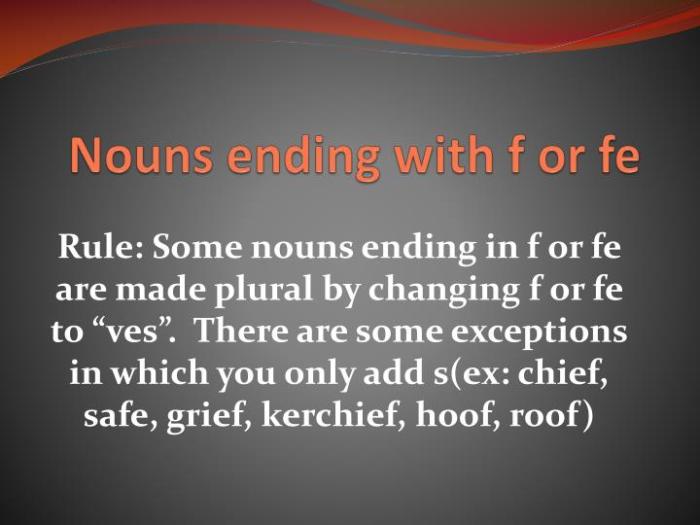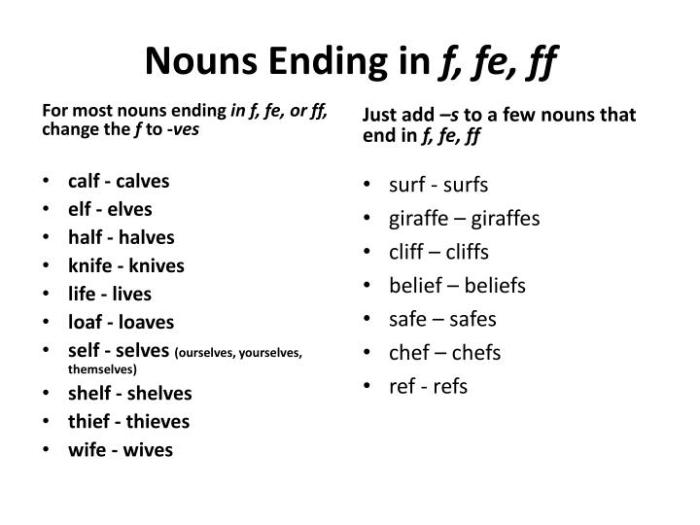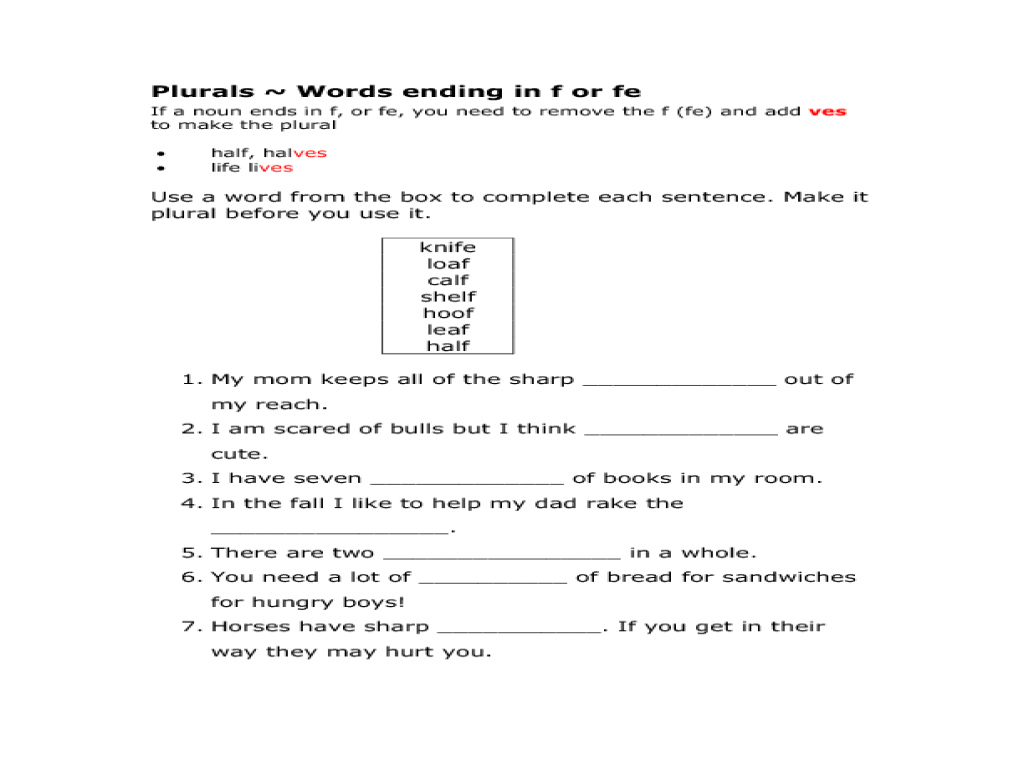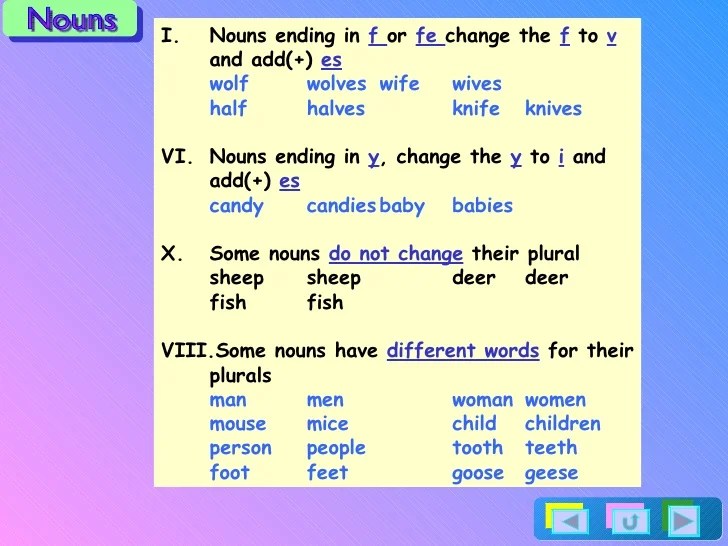Delving into the realm of nouns ending in f or fe, we embark on a linguistic journey that unravels their etymological roots, morphological structure, and diverse syntactic roles. These nouns, often imbued with distinctive phonological features, hold cultural significance and semantic relationships that invite exploration.
From their historical origins to their contemporary usage, nouns ending in f or fe offer a captivating glimpse into the intricate tapestry of language.
Nouns Ending in “f” or “fe”
Nouns ending in “f” or “fe” represent a specific category of words in English grammar. These nouns often denote various objects, concepts, or entities characterized by their unique attributes or functions.
To further clarify this concept, let’s explore a comprehensive list of nouns ending in “f” or “fe” along with their respective meanings:
Nouns Ending in “f”
- Chief:A leader or head of a group or organization.
- Cliff:A steep, high face of rock.
- Elf:A mythical creature often depicted as small, with pointed ears and a mischievous nature.
- Grief:Intense sorrow or distress.
- Leaf:The flat, green part of a plant that grows from a stem.
- Life:The existence of an organism or the period during which an organism is alive.
- Proof:Evidence or information that establishes the truth or validity of something.
- Roof:The upper covering of a building that protects it from the elements.
- Thief:A person who steals.
- Wolf:A large, carnivorous mammal of the dog family.
Nouns Ending in “fe”
- Chief:A leader or head of a group or organization.
- Life:The existence of an organism or the period during which an organism is alive.
- Safe:A strongbox or other secure container for storing valuables.
- Wife:A married woman in relation to her husband.
Etymology of Nouns Ending in “f” or “fe”

Nouns ending in “f” or “fe” have a rich and varied history, with roots in multiple languages and cultures. These endings have been used for centuries to form nouns denoting a wide range of concepts, from abstract ideas to concrete objects.
Proto-Indo-European Origins
The origins of nouns ending in “f” or “fe” can be traced back to the Proto-Indo-European language, the ancestor of many modern European languages. In Proto-Indo-European, the suffix
Remember those tricky nouns ending in f or fe? They can be tricky to get right, especially if you’re brushing up on your grammar for the abeka algebra 2 quiz 28 . But don’t worry, you’ll get the hang of it with practice.
And while you’re at it, you might as well brush up on your nouns ending in f or fe too!
- -bʰ was used to form nouns denoting abstract concepts, such as “life” or “death.” This suffix later evolved into the Latin suffix
- -f, which was used to form nouns denoting qualities or states, such as “belief” or “grief.”
Latin Influence
Latin played a significant role in the development of nouns ending in “f” or “fe.” The Latin suffix-f was borrowed into English and French, where it was used to form nouns denoting a wide range of concepts. In English, nouns ending in “f” or “fe” often denote qualities, states, or actions, such as “belief,” “grief,” or “strife.”
In French, nouns ending in “f” or “fe” often denote feminine nouns, such as “femme” (woman) or “vie” (life).
Other Influences
In addition to Proto-Indo-European and Latin, other languages and cultures have influenced the development of nouns ending in “f” or “fe.” For example, the French suffix
-ie was borrowed into English, where it was used to form nouns denoting feminine qualities or occupations, such as “wife” or “niece.”
Morphological Analysis of Nouns Ending in “f” or “fe”

Nouns ending in “f” or “fe” exhibit a distinct morphological structure. They typically consist of a root word or base, followed by one or more suffixes. These suffixes play a crucial role in modifying the meaning and grammatical function of the noun.
Suffixes in Nouns Ending in “f” or “fe”
The most common suffixes used in nouns ending in “f” or “fe” include:
- -f: This suffix is typically used to form abstract nouns from verbs or adjectives. Examples include “belief” (from “believe”) and “proof” (from “prove”).
- -fe: This suffix is similar to “-f” and is also used to form abstract nouns. However, it is often used with nouns that denote a state or condition. Examples include “life” and “wife.”
- -ive: This suffix is used to form adjectives that describe a quality or characteristic. Examples include “active” and “creative.”
- -ment: This suffix is used to form nouns that denote an action, process, or result. Examples include “payment” and “experiment.”
These suffixes, along with others, combine with root words to create a wide range of nouns with varying meanings and grammatical functions.
Phonological Features of Nouns Ending in “f” or “fe”

Nouns ending in “f” or “fe” possess distinctive phonological characteristics that shape their pronunciation and perception. These features contribute to the unique sound patterns associated with these words.
One notable feature is the voiceless labiodental fricative sound represented by the letter “f.” This sound is produced by directing a stream of air through the narrow space between the lower lip and the upper teeth. The voiceless nature of this sound means that the vocal cords do not vibrate during its production.
Impact on Pronunciation
The voiceless “f” sound imparts a crisp and sharp quality to the pronunciation of nouns ending in “f” or “fe.” This sound stands out in speech, making these words easily distinguishable from others.
Impact on Perception
The distinctive phonological features of nouns ending in “f” or “fe” aid in their perception. The voiceless “f” sound creates a clear auditory cue that helps listeners identify these words amidst other speech sounds.
Syntactic Behavior of Nouns Ending in “f” or “fe”: Nouns Ending In F Or Fe
Nouns ending in “f” or “fe” exhibit a versatile syntactic behavior in English sentences. They can fulfill various syntactic roles and interact with other parts of speech to convey meaning and structure.
Subject
Nouns ending in “f” or “fe” can function as subjects in a sentence, indicating the entity or person performing the action or being described. For example:
- The chiefmade an important announcement.
- The wifecooked a delicious meal.
Object
These nouns can also serve as direct or indirect objects, receiving the action of the verb. For example:
- The manager gave the briefto the team.
- The teacher handed the safeto the student.
Complement
Nouns ending in “f” or “fe” can function as complements, providing additional information about the subject or object. For example:
- The student is a chief.
- The door was a safe.
Modifier
When used as modifiers, these nouns can describe or provide more information about other nouns or pronouns. For example:
- The chief’soffice is spacious.
- The wife’scooking is excellent.
Semantic Relationships of Nouns Ending in “f” or “fe”
Nouns ending in “f” or “fe” often exhibit specific semantic relationships that reflect their shared morphological features. These relationships can provide insights into the conceptual connections and patterns underlying the use of these nouns in the language.
Nouns Denoting States or Qualities
Many nouns ending in “f” or “fe” refer to states, qualities, or conditions. For example, “belief,” “grief,” “life,” and “wife” all denote intangible concepts or characteristics. These nouns typically function as abstract nouns, capturing the essence of an idea or quality rather than a physical entity.
Nouns Denoting Roles or Functions
Another common semantic relationship among nouns ending in “f” or “fe” is their reference to roles or functions. Nouns such as “chief,” “elf,” “proof,” and “sheriff” all denote individuals or entities that fulfill specific roles or functions within a social or professional context.
These nouns often convey a sense of authority, responsibility, or specialized knowledge.
Nouns Denoting Objects or Substances, Nouns ending in f or fe
While less common, some nouns ending in “f” or “fe” refer to tangible objects or substances. For example, “brief,” “cliff,” “knife,” and “roof” all denote physical entities. These nouns typically represent concrete, material objects rather than abstract concepts or qualities.
Cultural Significance of Nouns Ending in “f” or “fe”

Nouns ending in “f” or “fe” hold cultural significance and associations that extend beyond their linguistic form. They often evoke specific emotions, ideas, or concepts within a particular culture.
In literature, these nouns are frequently used to create vivid imagery and evoke a sense of nostalgia or longing. For example, the word “life” evokes a sense of wonder and appreciation for the beauty of existence, while the word “wife” conveys a sense of companionship and shared experiences.
Use in Folklore
In folklore, nouns ending in “f” or “fe” often represent magical or mystical beings. For instance, the word “elf” evokes images of mischievous and playful creatures, while the word “faerie” conjures up visions of ethereal and otherworldly beings.
Top FAQs
What are nouns ending in f or fe?
Nouns ending in f or fe are a group of words that share a common morphological feature, characterized by their final consonant sounds.
What is the etymology of nouns ending in f or fe?
Nouns ending in f or fe often trace their origins to various languages and cultures, with some deriving from Latin, French, or Germanic roots.
What are some examples of nouns ending in f or fe?
Examples of nouns ending in f or fe include words like “chief,” “belief,” “knife,” and “life.”